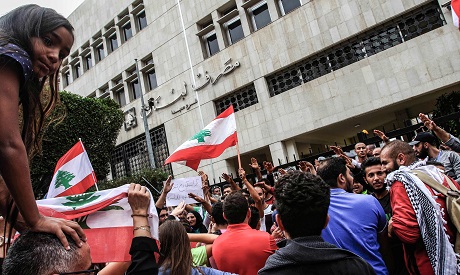The first round of sanctions of the went into effect on the 17th of June, placing economic sanctions on thirty-nine corporations and personalities that have ties to Syrian president, Bashar Al-Assad. The Caesar Act was passed in December of last year to punish the Syrian regime for the inhumane treatment of detainees in Syrian prisons. The law was named after the primary benefactor of the investigations, an individual known simply as “Caesar,” a former forensic photographer in Syria who has documented the torture and killing of detainees in Syrian prisons by the Assad regime. The threat of Syrian imprisonment was prominent in Lebanon during the civil war, in addition to the years after its end and up until Syrian withdrawal from Lebanon. However, that did not mean that all prisoners were set free, SOLIDE (the NGO for the Support of Lebanese in Detention and Exile) estimates that 17,000 Lebanese individuals were “kidnapped” by the Syrian government and their proxies.
These new sanctions are not the first to be imposed on the Syrian regime; since the beginning of the civil war in 2011, the US had enforced sanctions on the Syrian regime –but these are different since they are targeting new personalities such as the president’s sister, Bushra, his wife, Asma and his brother and commander of the fourth division, Maher Al-Assad. The sanctions have also targeted corporations and businessmen that are in support of the regime and that conduct operations in the following sectors: fuel, military aviation, engineering, and construction. The sanctions have not just targeted Syrian companies, but also pursued foreign agents of Iranian and Russian background who have been conducting business with Syria, as well as mercenary groups who have worked for the Assad government. The targeting of foreign agents in Syria is meant to cut off the last line of support for the regime by not allowing any hard currencies to enter the country –now Syria is forced to rely on getting the necessary goods it needs illegally through its neighbor Lebanon.
Syria perceives Lebanon as its extension on which it relies on for financial services as well as trade. On paper, Syria is not one of the top importers from Lebanon it rather conducts trade through other illegitimate channels. Smuggling along the Syrian border has long been an issue that the Lebanese government had to deal with, but after the breakout of the civil war in Syria, the demand for many necessities had increased and the most sought after commodities are fuel and flour. The smuggling of gasoline and flour, which are both goods subsidized by the Lebanese government, has been a serious problem for Lebanon, as it not only poses a problem for the local demand of these goods in Lebanon, but is also draining the country’s hard currency reserve since it is importing them and paying in dollars. In May, the government decided to crossings and entrusted the Lebanese armed forces to undertake this task. Between the 7th and 14th of May, they had that were exiting the country illegally. Although the army’s efforts have been drastic, the problem will persist because the country does not have any other alternatives at the moment to be able to meet the demand of the population. Additionally, the two countries share deep financial ties as an estimated $45 billion deposits in lebanese banks are of Syrian origins. These accoounts are relatively large and belong to multiple big names such as Rami Makhlouf who has been affected by the sanctions. One can predict that Lebanese banks will most likely adhere to the US authorities and comply to protect themselves, especially seeing that the crisis in Lebanon has weakened the banking sector considerably and they cannot risk further damages.
Economic sanctions are one of the weapons that the US has used historically to deal with its enemies such as North Korea, Iran, Iraq, and Cuba. The use of sanctions cannot by itself depose the ruling regime and that is not why the US utilizes sanctions. The objectives of these sanctions are to pressure governments into changing their policies, or to comply with US demands –such was the case with Iraq when the sanctions that were placed pressured the Iraqi Baathist regime into disarmament –however, the Iraqi situation differs from that of Syria. Prior to the sanctions, Iraq’s GDP was at $179.886 billion in 1990 and at a GDP per capita of $10,320, these numbers declined drastically after the sanctions were imposed: the GDP in 2000 reached only $6 billion with a GDP per capita of only $334. The Iraqi scenario differs from that of Syria, as the Syrian economy has now already been demolished: its GDP in 2020 is forecasted to reach $37 billion, a decrease from a high of $73 billion in 2012, while the GDP per capita is estimated to be $870 down from $1,700 in 2010. Therefore, the additional sanctions are being imposed at a time when the economy has already been badly damaged. The sanctions are just adding insult to injury since 83% of the Syrian population are already under the poverty line. The Syrian people cannot withstand another hit to their economy.
The regime is now facing a dilemma; the deterioration of the Syrian economy has left the Syrian people weak and vulnerable to an imminent famine, considering the shortage of flour and a decrease in purchasing power. The recent protests that erupted in the province of Dar’aa and Suwayda were not surprising, the Syrian people see that Bashar and his policies –especially his alliances with foreign countries –has brought them misery. Although the Syrian people have been calling for the departure of Bashar, it is highly unlikely that he will leave. Many international players have investments in the regime, such as Iran and Russia who have long backed the dictator. Bashar has his hands tied and is running out of time to find a solution to the crisis, if he does not, he might be looking at renewed clashes between the state military and rebels.





